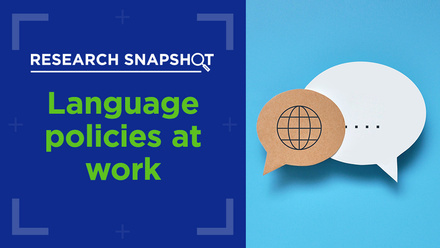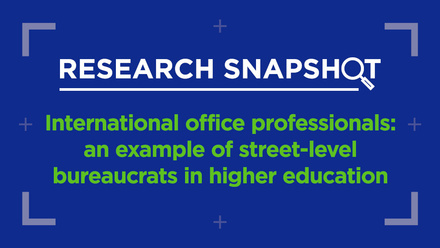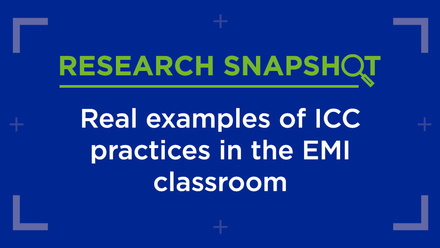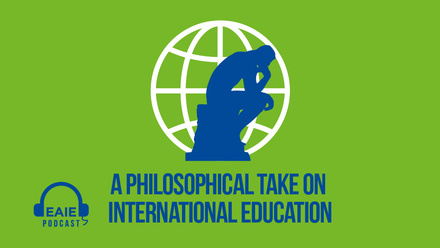Helping international researchers thrive abroad

Many studies indicate that international collaboration and mobility are crucial for research and innovation. Moreover, it is essential for researchers’ professional advancement and encourages them to access supplementary, frequently specialised expertise, develop new ideas on research, access funding opportunities and further extend professional connections. International collaboration and mobility are thus essential components and all researchers are expected to engage in international mobility at least once in their careers. This requirement increases as researchers move forward in their academic careers.
Mobility is often experienced as challenging and the obstacles can be perceived as insurmountable, resulting in increased tension, worry and despair, which in turn can negatively impact their health, well-being and productivity. The type and intensity of international mobility varies strongly according to cultural and administrative differences between the countries of origin and destination, as well as the quality of consulting facilities in the destination country. When faced with issues on a personal and professional level, foreign researchers typically search for solutions on their own, within the margins of what is within their autonomy. A study on international students indicates that they are engaged in greater self-care than those in their home countries. Such findings suggest that, under the right conditions, being engaged in international mobility may also boost competencies that enhance personal well-being.
Challenges for international researchers
Adapting to a new country's culture and environment can be experienced as a challenging aspect of international research. This is especially the case when researchers are unfamiliar with the language and local cultural habits, which may lead to reduced access to much-needed information and feelings of isolation and loneliness. Also, the institutional setting, organisational structure and culture have a big effect on employees’ health and well-being.
It is essential to foster a friendly and inclusive culture that enables international researchers to establish relationships
Researchers indicate that finding a place to live is another important difficulty, especially when the relocation of family members is involved as well. In many instances, unfamiliarity with the local housing market makes it challenging to find housing that is both affordable and aligned with their needs, such as proximity to schools and child care facilities. Barriers to international mobility include in particular access to funding, family obligations, lack of information about employment abroad and visa-related obstacles. Furthermore, the same study emphasises that African and Asian respondents generally encountered greater barriers to international movement than their North American and European colleagues.
How universities can help
In order to create optimal conditions, it is essential that universities and research institutes provide tools that help international researchers to overcome these challenges so that they can operate efficiently and successfully in their new workplaces. For instance, by providing (i) a welcome package for international researchers that contains crucial information regarding the local housing market, healthcare system and employment rules; and (ii) access to sufficient opportunities for language education, cultural training and mentoring programmes. These actions should ensure that researchers feel welcomed and supported.
The integration of international researchers can be greatly improved by onboarding procedures that build on theoretical frameworks such as self-determination theory, thereby increasing feelings of competence, autonomy and relatedness in order to nurture and strengthen the researcher’s motivational drive. Concretely, this means providing access to (a) skills training and professional development services; (b) welcoming services, mentoring programmes and integration activities that ensure researchers feel part of a collective endeavour; and (c) structures that facilitate scientific work through an optimal mix of research infrastructure, guidance and autonomous decision-making.
Besides the assistance of fellow scholars, colleagues and locals, we encourage universities and research institutions to provide the necessary support services to welcome international researchers. To achieve this, they can facilitate, strengthen and recognise the efforts of locally-rooted researcher networks. It is essential to foster a friendly and inclusive culture that enables international researchers to establish relationships and feel both encouraged and empowered. In addition, both national and international support is vital for implementing retirement and social security systems that are more accommodating for international scholars.
Shared responsibility
We can conclude that researchers on mobility face a number of problems that can impact their performance, mental health and well-being. A welcome package and onboarding procedure can greatly improve their experience as they provide for smooth adjustment and integration at the host institution as well as exposure to local culture. It is not just the obligation of institutions, but also of individuals and countries, to improve academic working environments and assist foreign researchers in their mobility endeavours. For instance, the Researcher Mental Health and Well-Being Manifesto calls for policies that monitor, improve and maintain well-being and mental health in the research environment, outlining more inclusive metrics of success and quality, promoting work-life balance, inclusivity and family-friendly sustainable research careers.
Such a shared responsibility will contribute to the development of a more inclusive and supportive atmosphere, enabling foreign scholars to flourish, which in turn positively impacts the cultural and socioeconomic realities of both the host country and country of origin.
This article is based upon work from the ReMO COST Action on Researcher Mental Health, CA19117, supported by COST (European Cooperation in Science and Technology).






